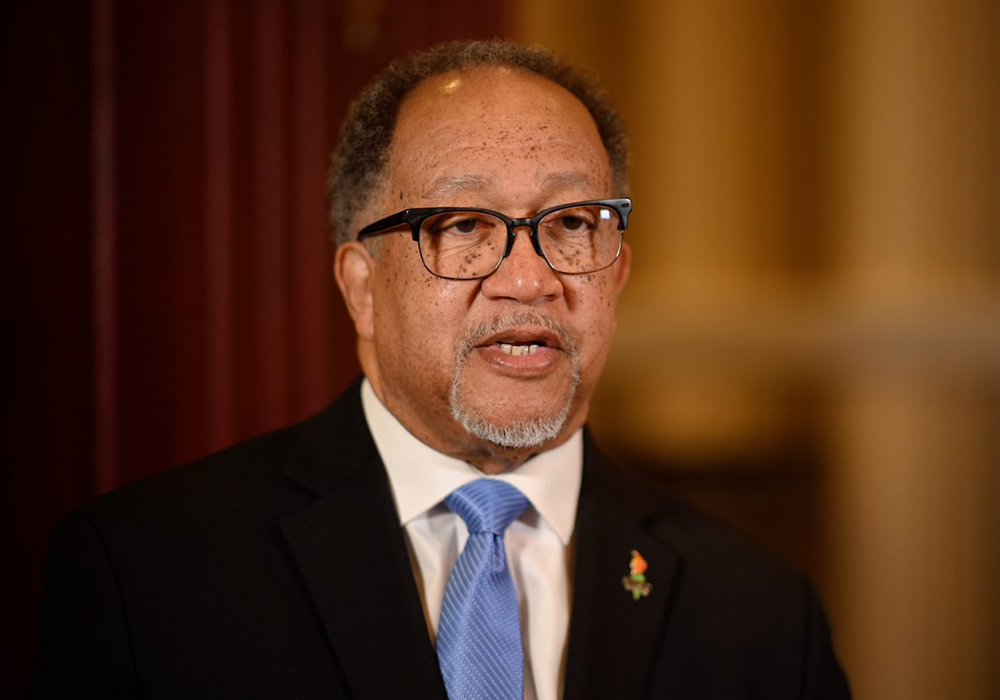Bro. Dr. Benjamin Chavis | Honorary #4

Bro. Dr. Benjamin Franklin Chavis Jr. was born and grew up in Oxford, North Carolina. In 1960 at the age of twelve, Chavis became the first African American to be issued a library card at the segregated public library. In 1963, while a high school student, Chavis became a statewide youth coordinator in North Carolina for Martin Luther King Jr. and the Southern Christian Leadership Conference (SCLC). He also joined CORE, SNCC and AFSCME. He graduated from Mary Potter High School in 1965 and entered St. Augustine College in Raleigh as a freshman. He earned a Bachelor of Arts in Chemistry from the University of North Carolina at Charlotte (1969).
In 1968, Chavis also worked for the presidential campaign of Robert F. Kennedy. After his graduation from UNCC in 1969, Chavis returned to Oxford and taught at the Mary Potter High School, which were still segregated for African-American students although federal courts had ordered the state to desegregate. In 1970, after the killing of 23-year-old Henry Marrow and the acquittal by an all-white jury of the three men indicted on charges, Chavis organized a protest march from Oxford to North Carolina's State Capitol Building, in Raleigh. After the Oxford-to-Raleigh march, Chavis organized a black boycott of white businesses in Oxford that lasted for 18 months until the town agreed to integrate its public facilities, including schools.
Chavis was appointed Field Officer in the United Church of Christ Commission for Racial Justice in 1968.
Chavis was ordained in the United Church of Christ in 1980[9] and in 1985 was named the executive director and CEO of the UCC-CRJ
Chavis worked in the civil rights movement, leading a march in 1970 to the state capital in protest after three white men were acquitted of killing Henry D. Marrow in Oxford. In 1971 the Commission for Racial Justice assigned Field Officer Chavis to Wilmington, North Carolina to help desegregate the public school system. Since the city had abruptly closed the black high school, laid off its principal and most of its teachers, and distributed the students to other schools, there had been conflicts with white students. The administration did not hear their grievances, and the students organized a boycott to protest for their civil rights.
Chavis and nine others were arrested in February 1972, charged with conspiracy and arson. Following a controversial trial, all ten were convicted in 1972. The oldest man at age 24, Chavis drew the longest sentence, 34 years. The ten were incarcerated while supporters pursued appeals. The case of the Wilmington Ten was condemned internationally as a political prosecution.
In 1978 Amnesty International described Benjamin Chavis and eight others of the Wilmington Ten still in prison as "American political prisoners" under the definition of the Universal Rights of Man and the UN Universal Declaration of Human Rights. They were prisoners of conscience. In December 1980, the Federal Fourth Circuit Court of Appeals ordered a new trial and overturned the original conviction because of "prosecutorial misconduct."
Chavis drew from this experience in his books: An American Political Prisoner Appeals for Human Rights (1978) (written while he was still in prison) and Psalms from Prison. In 1978, Chavis was named as one of the first winners of the Letelier-Moffitt Human Rights Award.
Some have asserted that Chavis coined the term environmental racism in 1982, during environmental justice protests in Warren County, NC, although Carolyn A. Burrow (Adjoa Aiyetero) had used the term in 1970. Over the past four decades, Chavis has emerged as the "Godfather of the Environmental Justice Movement." Some have asserted that Benjamin Chavis cried out: "this is environmental racism!" at the moment of his arrest during the 1982 PCB landfill protests in North Carolina, but legal scholar Richard J. Lazarus found this likely apocryphal; Chavis first was recorded using the term in 1987. He writes in the forward of a 1993 testimonial of the environmental justice movement:
Environmental racism is racial discrimination in environmental policymaking. It is racial discrimination in the enforcement of regulations and laws. It is racial discrimination in the deliberate targeting of communities of color for toxic waste disposal and the siting of polluting industries. It is racial discrimination in the official sanctioning of the life-threatening presence of poisons and pollutants in communities of color. And, it is racial discrimination in the history of excluding people of color from the mainstream environmental groups, decisionmaking boards, commissions, and regulatory bodies.
In 1986 Chavis conducted and published the landmark national study: Toxic Waste and Race in the United States of America, that statistically revealed the correlation between race and the location of toxic waste throughout the United States.[16] Chavis is considered by many environmental grassroots activists to be the "Godfather of the post-modern environmental justice movement" that has steadily grown throughout the nation and world since the early 1980s.
On December 31, 2012, Chavis and the surviving members of the Wilmington Ten were granted Pardons of Innocence by North Carolina Governor Beverly Perdue. The New York Times editorialized for the pardons of innocence for the Wilmington 10 as the case had become an international cause celebre as an example of virulent racist political prosecution.
In 1980 the federal appeals court overturned the convictions, citing "prosecutorial misconduct." and ordering a new trial. The state of North Carolina decided against a trial. North Carolina Governor Beverly Perdue issued "Pardons of innocence" to each member of the Wilmington 10 on December 31, 2012.
Chavis received his Master of Divinity (Magna Cum Laude) from Duke University (1980) and a Doctor of Ministry (D.Min.) from Howard University (1981). Chavis was admitted into the PhD program in Systematic Theology as a graduate student at Union Theological Seminary of Columbia University and completed all of the academic course requirements in 1984.
In 1988, Chavis was elected Vice President of the National Council of Churches. Chavis also served as chairman of its Prophetic Justice unit as a Minister of the United Church of Christ. In 1993, Chavis was selected as the executive director and CEO of the National Association for the Advancement of Colored People (NAACP), the youngest to hold this office. Chavis first joined the organization at the age of twelve as a youth leader of the Granville County, North Carolina NAACP Branch.
Chavis traveled to a Los Angeles, CA housing project to "get to the heart of the issue," stating that in economically deprived areas, youth often go from childhood to adulthood with no adolescence because of the economic demands. On August 28, 1993, NAACP Chairman William Gibson, Executive Director Benjamin F. Chavis Jr., Coretta Scott King, William Fauntroy, and AFL-CIO's Lane Kirkland joined to organize the 30th Anniversary March on Washington for Economic Democracy. In 1993, President Clinton named Chavis to the twenty-five-member President's Council on Sustainable Development to help develop U.S. policies that would encourage economic growth, job creation, and environmental protection.
The NAACP in 1993 received a $2 million commitment from the estate of the late Reginald F. Lewis to establish the NAACP Reginald F. Lewis Memorial Endowment.
Chavis spoke on the PBS series Earthkeeping. He said that "environmental racism" was a life-and-death issue and noted the work of the NAACP to end it. Chavis said that often people of color were excluded from decisions on public policy. The NAACP organized Branches to speak out on the issue and advocated for reform of the Superfund legislation.
In 1994, Chavis set the NAACP's focus on economic empowerment to ensure a strong economic infrastructure for the African-American and other communities of color. The NAACP created a Telecommunications Task Force of board members and industry leaders to ensure that African Americans took part in the ownership, management, and total employment package of President Clinton's proposed "National Information Superhighway."
The NAACP conducted a voter education teleconference in seventeen cities across the U.S. to prepare South African citizens residing in the U.S. and NAACP volunteers for participation in the special South African elections on April 26.
Through the NAACP Community Development Resource Centers (CDRC), the Association established the Youth Entrepreneurial Institute to sharpen business acumen and launch enterprises for students ages fourteen to eighteen. In May 1994, Chavis led the NAACP and other organizations in sponsoring a youth summit to seek solutions to the drugs and violence in their communities.
In 1994, Chavis convened summit conferences of civil rights leaders in Baltimore in August and in Chicago in December. In June 1995, they founded the National African American Leadership Summit (NAALS). A constitution and by-laws were adopted that month. Chavis served as executive director and CEO of NAALS from 1995 to 1997.
In 1995, NAALS appointed Chavis to serve as the National Director of the Million Man March Organizing Committee that conceived, designed, arranged and promoted the Million Man March.
In 2007 Chavis headed H3 Enterprises and the HipHopSodaShop, the first hip-hop corporation that soon opened two shops in Tampa and Miami, Florida. Due to pre-existing conditions, H3 closed the shops, and Chavis retired. One year later, H3 Enterprises sued Chavis for mismanagement, however an amicable settlement was reached in this case after the routine countersuit of Chavis.
Chavis was the president of Education Online Services in Fort Lauderdale, until he retired to accept other opportunities for professional advancement. He serves as the senior strategic advisor to the Diamond Empowerment Fund in New York. In June 2014, the National Newspaper Publishers Association elected Chavis to the office of president of their two hundred member association.
A popular public speaker, Chavis frequently addresses academic, commercial and non-profit organizations and is a prominent spokesman in the national and international media.
In 2013, Chavis began writing weekly columns for the National Newspaper Association. His columns both insightful and educational, have been published in the country's leading minority newspapers, such as The AFRO. Theologically, Chavis has worked for decades on identifying the common points of unity between the three Abrahamic faiths of Judaism, Christianity and Islam. Today, Chavis continues to work on ecumenical and interfaith matters across the United States and throughout the world.
Awards
Duke Univ., Environmental Justice and Racial Equity Fellow (2023), Presidential Lifetime Achievement Award (2022), NNPA Lifetime Achievement Award.

